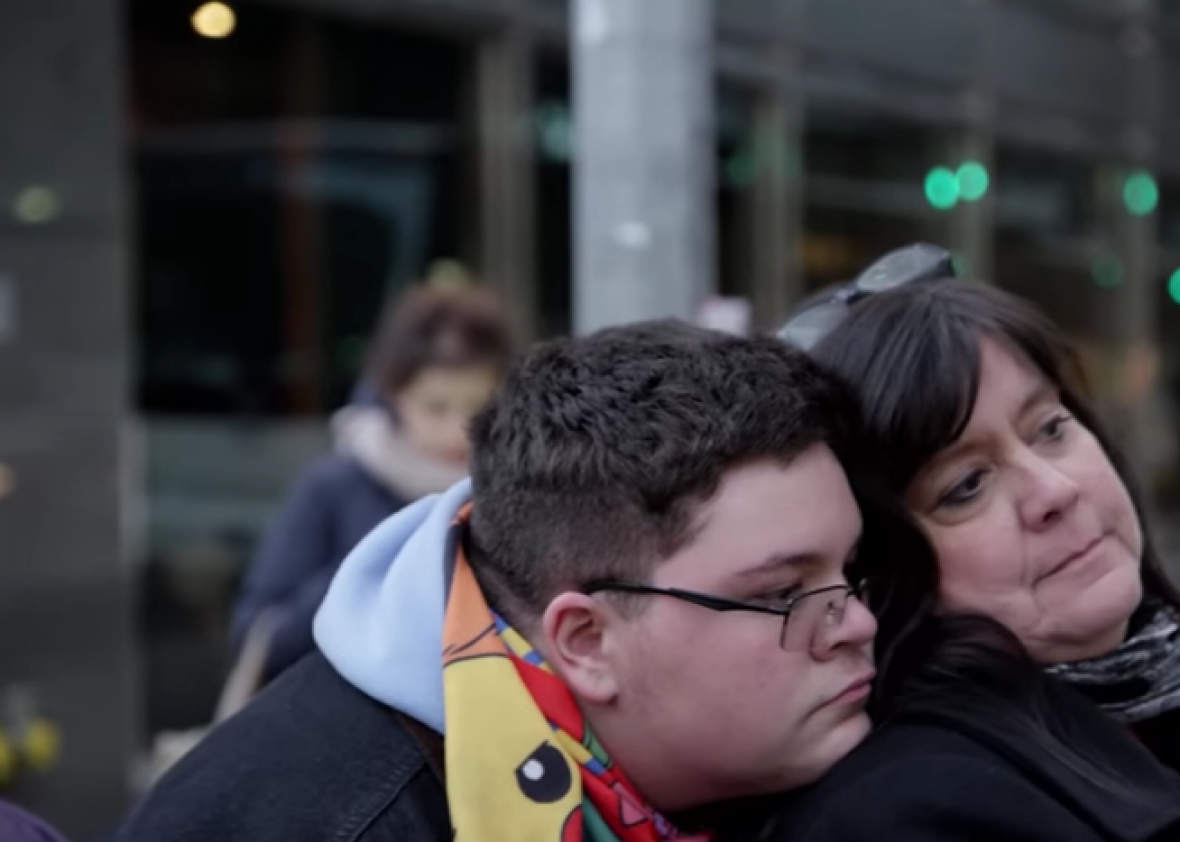On Friday, the 4th U.S. Circuit Court of Appeals vacated a preliminary injunction that had allowed Gavin Grimm, a transgender teenager in Gloucester County, Virginia, to use the boys’ bathroom at his high school. That injunction was issued in response to the 4th Circuit’s determination in 2016 that, under guidelines promulgated by the Obama administration, schools must let trans students use the correct bathroom. But in February, the Trump administration revoked that guidance. That turnabout led the Supreme Court to vacate the 4th Circuit’s landmark decision. With that precedent wiped off the books, the 4th Circuit was compelled, in turn, to vacate the injunction. Grimm will finish out his senior year without being able to use the boys’ bathroom.
These developments were expected: With the Obama guidance gone, Grimm will have to re-litigate his case using a different legal theory. What wasn’t unexpected, however, was the incredibly poignant four-page concurrence to Friday’s order written by Judge Andre Davis and joined by Judge Henry Floyd. Davis and Floyd ruled in favor of Grimm last year, and they were clearly disturbed by the discrimination Grimm faced. Davis explained that “G.G.”—identified by his initials because he is a minor—defended his right to “dignity and privacy” at a school board meeting and explained “clearly and eloquently” that “he was not a predator, but a boy, despite the fact that he did not conform to some people’s idea about who is a boy.
“He knew,” Davis wrote, “intuitively, what the law has in recent decades acknowledged: the perpetuation of stereotypes is one of many forms of invidious discrimination. And so he hoped that his heartfelt explanation would help the powerful adults in his community come to understand what his adolescent peers already did.”
Unfortunately, the school board did not understand Grimm’s plea. Instead, it permanently barred him from the boys’ bathroom. “Our country,” Davis noted, “has a long and ignominious history of discriminating against our most vulnerable and powerless.” He continued:
We have an equally long history, however, of brave individuals—Dred Scott, Fred Korematsu, Linda Brown, Mildred and Richard Loving, Edie Windsor, and Jim Obergefell, to name just a few—who refused to accept quietly the injustices that were perpetuated against them. It is unsurprising, of course, that the burden of confronting and remedying injustice falls on the shoulders of the oppressed. These individuals looked to the federal courts to vindicate their claims to human dignity, but as the names listed above make clear, the judiciary’s response has been decidedly mixed. Today, G.G. adds his name to the list of plaintiffs whose struggle for justice has been delayed and rebuffed; as Dr. King reminded us, however, “the arc of the moral universe is long, but it bends toward justice.” G.G.’s journey is delayed but not finished.
Davis then situated Grimm’s plight in the broader context of the struggle for equal rights. “G.G.’s case,” he wrote, “is about much more than bathrooms.”
It’s about a boy asking his school to treat him just like any other boy. It’s about protecting the rights of transgender people in public spaces and not forcing them to exist on the margins. It’s about governmental validation of the existence and experiences of transgender people, as well as the simple recognition of their humanity. His case is part of a larger movement that is redefining and broadening the scope of civil and human rights so that they extend to a vulnerable group that has traditionally been unrecognized, unrepresented, and unprotected.
“Today,” Davis concluded, “hatred, intolerance, and discrimination persist—and are sometimes even promoted—but by challenging unjust policies rooted in invidious discrimination, G.G. takes his place among other modern-day human rights leaders who strive to ensure that, one day, equality will prevail, and that the core dignity of every one of our brothers and sisters is respected by lawmakers and others who wield power over their lives.”
It is an extraordinary opinion, searing and candid yet also eloquent and moving. It is, in essence, a tribute to Grimm and his fight—and the broader campaign for transgender equality. Friday’s order did not bring Grimm the justice he so deserves. But it did allow two judges to defend his right to equal dignity, and to promote a more tolerant vision of society. “The law,” Davis wrote, “eventually catches up to the lived facts of people.” It has not yet caught up with Grimm. But it will.
